Maintaining good gut health is crucial for overall well-being, and our daily eating habits play a significant role in it. Many common foods we consume can negatively impact our digestive system, leading to discomfort and health issues. This blog post explores 21 everyday eats that might be silently wreaking havoc on your gut health. From processed snacks to sugary drinks, these items may be part of your regular diet, but understanding their effects can help you make informed choices. Let’s delve into these gut-disrupting foods and explore alternatives for a healthier digestive system.
Processed Meats

Processed meats like sausages, bacon, and ham are convenient and flavorful but can be detrimental to gut health. They often contain additives and preservatives, which may disrupt the gut microbiome balance. Consuming these meats regularly has been linked to inflammation and digestive issues. The high sodium content can also lead to bloating and discomfort.
Consider cutting back on processed meats and opting for fresh, lean protein sources. This change can promote a healthier gut environment and reduce the risk of associated health problems.
Exploring plant-based protein options is another excellent way to support gut health.
Sugary Beverages

Sugary beverages are popular thirst-quenchers but pose significant risks to gut health. The high sugar content can feed harmful bacteria, leading to an imbalance in the gut microbiome. This imbalance can contribute to digestive problems and inflammation.
Regularly consuming sugary drinks may also interfere with the body’s ability to absorb essential nutrients, further compromising gut health. Opting for water, herbal teas, or natural fruit juices is a healthier choice.
These alternatives can help maintain digestive harmony and reduce sugar intake, promoting a balanced gut environment.
Artificial Sweeteners

Artificial sweeteners are a common sugar substitute but may have unintended effects on gut health. Some studies suggest that these sweeteners can alter gut microbiota, potentially leading to digestive issues and glucose intolerance. Despite being low-calorie, they might not be the best choice for maintaining a healthy gut.
Switching to natural sweeteners like honey or maple syrup can be a better option. These natural alternatives not only provide sweetness but also offer some beneficial nutrients.
It’s important to consume them in moderation to avoid excessive calorie intake.
Fried Foods

Fried foods, with their irresistible crunch and taste, are often a staple in many diets, but they can wreak havoc on gut health. The high fat content can slow digestion, causing bloating and discomfort. Additionally, the oils used in frying can be inflammatory, leading to digestive disturbances.
Reducing the consumption of fried foods and choosing baked or grilled options can significantly benefit gut health. These cooking methods preserve flavor while being gentler on the digestive system.
Incorporating more vegetables and whole grains can further enhance gut wellness.
Refined Grains
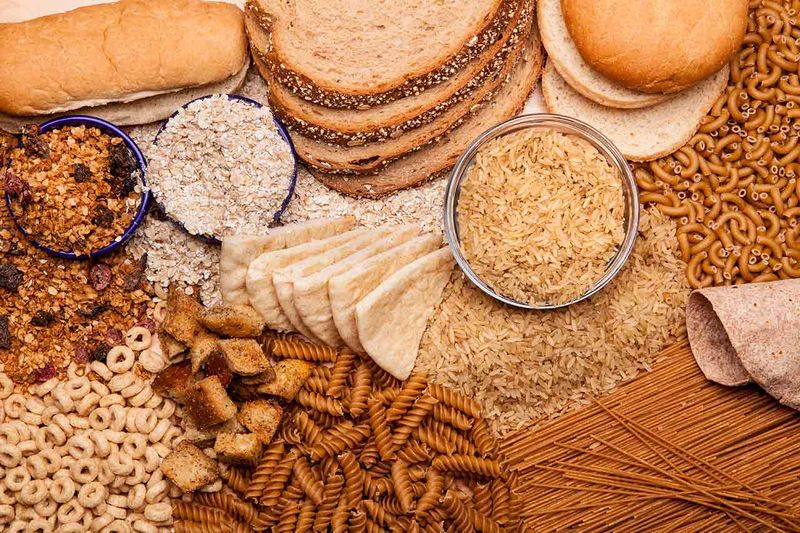
Refined grains, such as white bread, pasta, and pastries, lack fiber and essential nutrients due to processing. This can lead to digestive issues and an imbalance in gut bacteria. Fiber is crucial for maintaining healthy digestion and promoting gut health.
Switching to whole grains like brown rice, whole wheat bread, and quinoa can provide the necessary fiber for a healthy gut. These grains support regular bowel movements and nourish beneficial gut bacteria.
Whole grains also provide sustained energy and are a nutritious addition to any diet.
Dairy Products
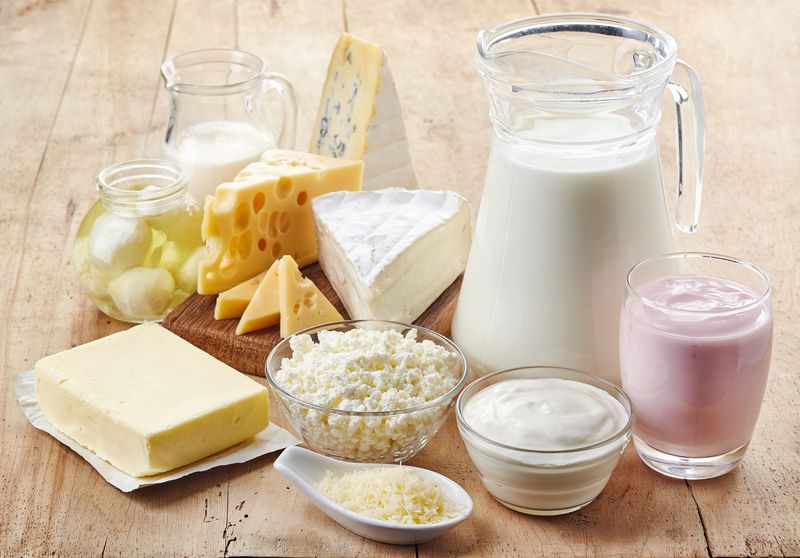
Dairy products can be a source of discomfort for many, particularly for those with lactose intolerance. Consuming dairy can lead to bloating, gas, and digestive upset, impacting gut health negatively.
For individuals sensitive to lactose, switching to lactose-free dairy or plant-based alternatives like almond or soy milk may be beneficial. These alternatives can provide similar nutritional benefits without the digestive discomfort.
Incorporating fermented dairy products like yogurt, which contains probiotics, can also support gut health effectively.
Alcohol

Alcohol is a common part of social gatherings, but excessive consumption can disturb the gut’s natural balance. It can irritate the digestive tract lining and negatively affect the gut microbiome.
Moderation is key when it comes to alcohol consumption. Reducing intake or opting for low-alcohol beverages can help minimize its impact on gut health.
Staying hydrated and pairing drinks with food can also lessen alcohol’s adverse effects on the digestive system.
Spicy Foods

Spicy foods add zest to meals but can sometimes lead to digestive discomfort. They may cause irritation in the digestive tract, leading to heartburn or stomach upset in sensitive individuals.
For those who experience discomfort, reducing spicy food intake or choosing milder spices can help maintain gut comfort. Balancing spice with cooling ingredients like yogurt or cucumber can also mitigate negative effects.
Exploring different herbs and spices can add flavor without compromising gut well-being.
High-Fat Dairy
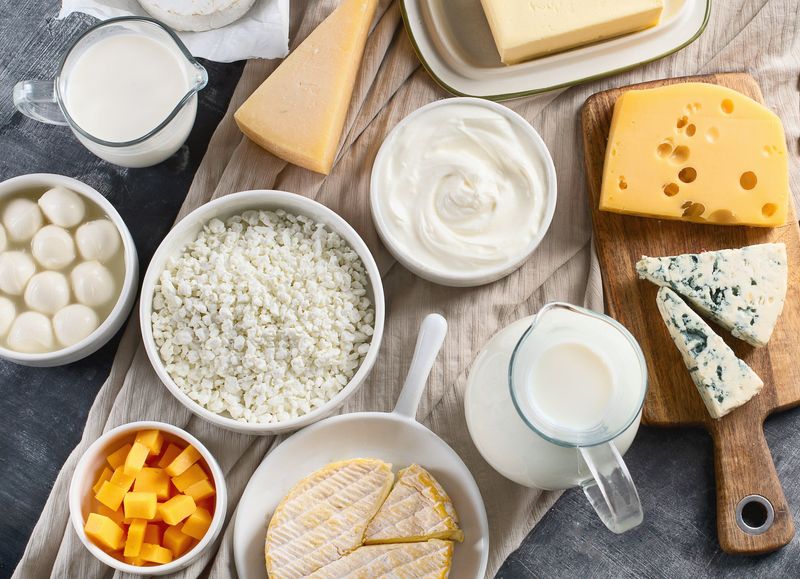
High-fat dairy products, while rich and indulgent, can be tough on the digestive system for some people. The high fat content can slow digestion, causing feelings of heaviness and discomfort.
Opting for lower-fat dairy options or plant-based alternatives can alleviate these issues. These choices provide similar nutrients without the digestive strain.
Incorporating probiotic-rich foods like kefir can also promote a balanced gut environment.
Caffeinated Drinks
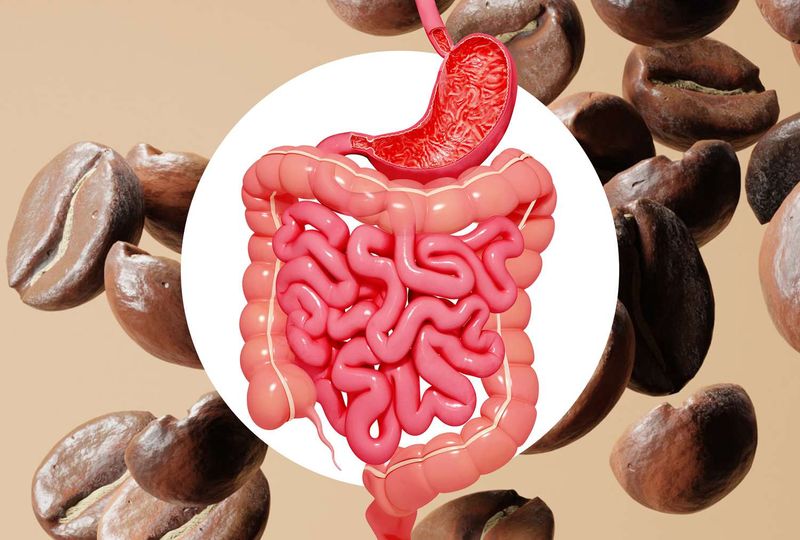
Caffeinated drinks like coffee and energy drinks are popular for their stimulating effects, but they may contribute to digestive discomfort. Caffeine can increase stomach acid production, leading to heartburn or indigestion.
Moderating caffeine intake and choosing decaffeinated options can help those sensitive to its effects maintain gut comfort. Pairing these drinks with meals can also mitigate adverse reactions.
Exploring herbal teas as alternatives can provide warmth and flavor without caffeine’s potential downsides.
Gluten-Containing Foods

For those with gluten sensitivity or celiac disease, consuming gluten-containing foods can lead to digestive disturbances and damage to the gut lining. Symptoms can include bloating, diarrhea, and abdominal pain.
Switching to gluten-free alternatives can alleviate these symptoms and support gut health. Reading labels and choosing naturally gluten-free foods like rice and quinoa is essential for those affected.
These changes can promote a more comfortable and balanced digestive system.
Carbonated Drinks

Carbonated drinks, with their fizzy appeal, can cause bloating and gas in many individuals. The carbonation introduces excess air into the digestive system, leading to discomfort.
Reducing the intake of carbonated beverages or opting for non-carbonated alternatives can help keep the digestive system happy. Choosing water or herbal teas can prevent bloating while keeping hydration levels up.
These changes can enhance overall gut wellness and comfort.
Red Meat
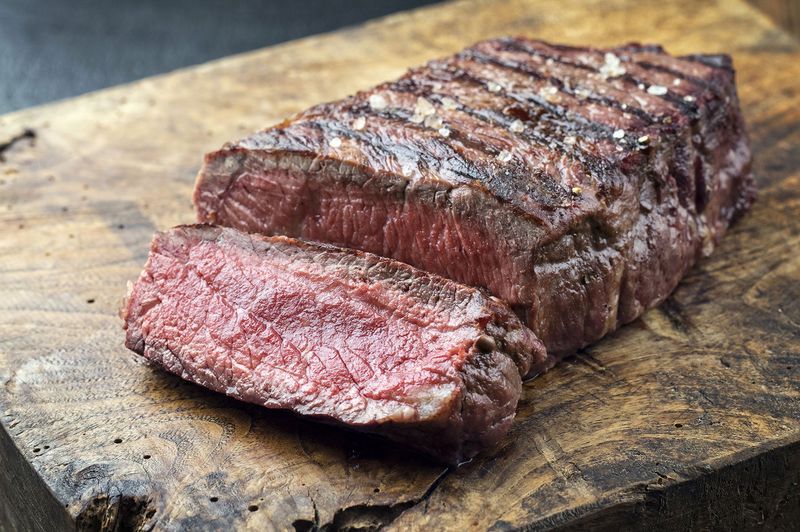
Red meat, though rich in protein, can be hard to digest for some individuals. Its high fat content can slow digestion, leading to discomfort and heaviness.
Choosing leaner cuts of meat or incorporating more plant-based protein sources can benefit gut health. Reducing red meat intake and balancing it with vegetables and whole grains can promote a healthier digestive system.
These adjustments can enhance nutrient absorption and gut function.
High-Sugar Snacks

High-sugar snacks, while satisfying sweet cravings, can disrupt the gut microbiome. Excessive sugar consumption encourages the growth of harmful bacteria, leading to an imbalance.
Opting for snacks with natural sweetness like fruits or nuts can support gut health. These alternatives offer nutrients and fiber without the negative impact of refined sugars.
Incorporating a variety of snacks can keep the gut microbiome diverse and balanced.
Salty Snacks

Salty snacks, though tempting, can lead to digestive discomfort when consumed in excess. The high sodium content can cause bloating and water retention.
Opting for unsalted or lightly salted snacks can alleviate these issues. Pairing these snacks with fresh fruits or vegetables can add nutritional value and support gut health.
These simple changes can enhance overall digestive comfort.
Instant Noodles

Instant noodles, while convenient, are often high in sodium and artificial additives that can affect gut health negatively. The lack of nutrients and fiber in these meals can lead to digestive disturbances.
Incorporating fresh vegetables and lean proteins into noodle dishes can enhance nutritional value and support a balanced gut environment. Choosing whole grain or rice noodles can also offer more fiber.
These adjustments make for a healthier and more satisfying meal.
Processed Cheese
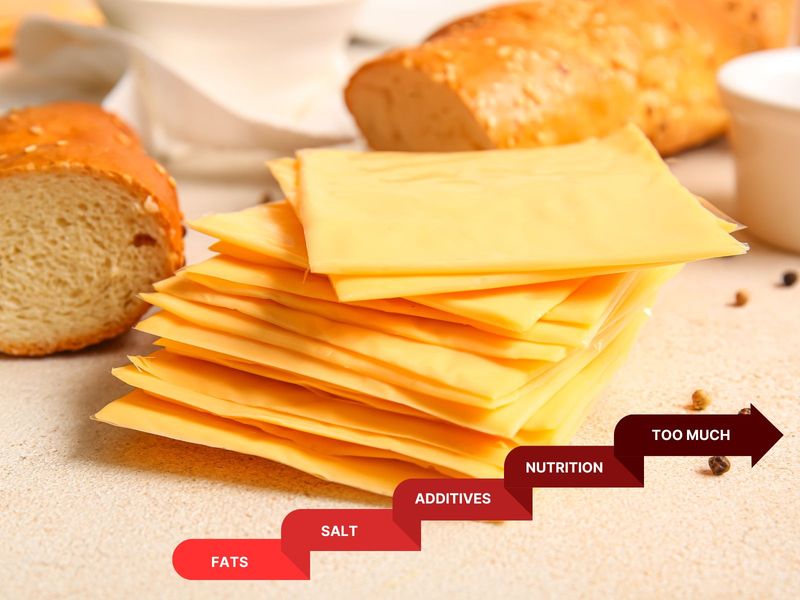
Processed cheese, with its creamy texture, contains additives and preservatives that may not be gut-friendly. Consuming it regularly can lead to digestive discomfort and bloating.
Opting for natural cheeses or dairy-free alternatives can be a healthier choice. These options often contain fewer artificial ingredients and provide essential nutrients.
Adding a variety of cheeses to the diet can support a balanced gut environment.
Canned Soups
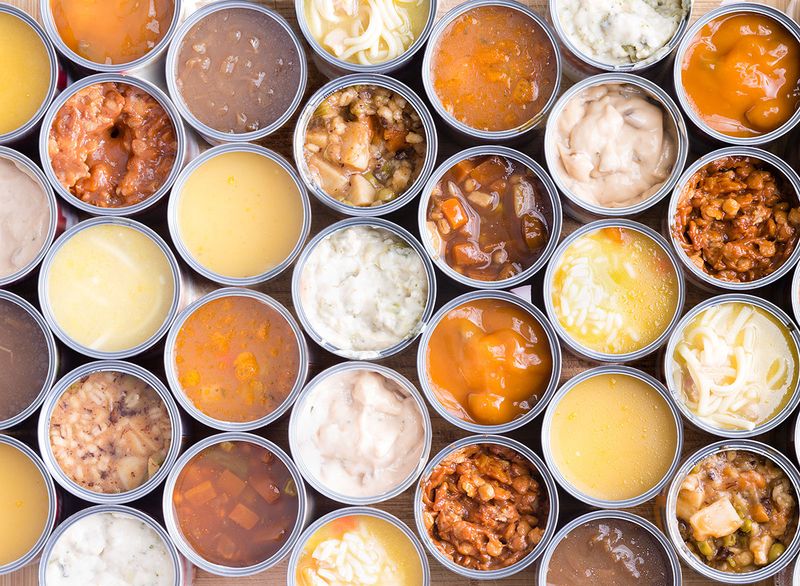
Canned soups, though convenient, often contain high levels of sodium and preservatives that can affect gut health. These ingredients can lead to bloating and discomfort.
Choosing low-sodium or homemade soups can offer a healthier alternative. Adding fresh herbs and vegetables can enhance flavor and nutritional value.
These choices support a balanced diet and promote gut wellness.
Energy Drinks

Energy drinks, popular for their quick energy boost, are high in caffeine and sugar, which can disrupt gut balance. Consuming them frequently may lead to digestive issues and nutrient malabsorption.
Opting for water or natural energy sources like nuts and fruits can provide sustained energy without the negative side effects. Reducing caffeine intake can also support gut health.
These alternatives encourage a healthier lifestyle and digestive system.
Frozen Meals
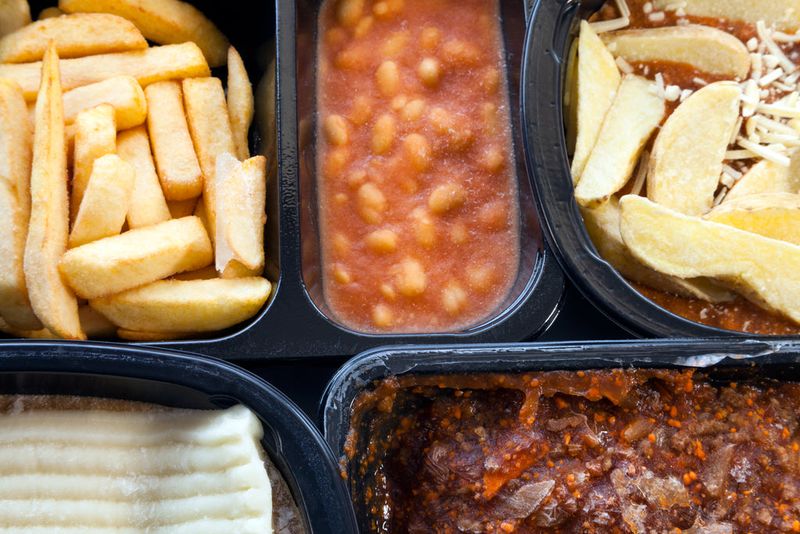
Frozen meals offer convenience but often contain high sodium and preservatives that can impact gut health. These ingredients can lead to bloating and discomfort.
Preparing fresh meals at home with whole ingredients can greatly benefit gut wellness. Incorporating a variety of vegetables and lean proteins ensures a nutritious and balanced diet.
These changes promote better gut health and overall well-being.
Pastries

Pastries, with their buttery layers and sweet fillings, can be a delight but aren’t always kind to the gut. High in refined sugars and fats, they can lead to digestive issues and an imbalanced microbiome.
Enjoying pastries in moderation and opting for whole-grain options when possible can minimize negative effects. Pairing them with fiber-rich fruits can also support digestion.
These habits can enhance gut health while still allowing for occasional indulgence.
Leave a comment